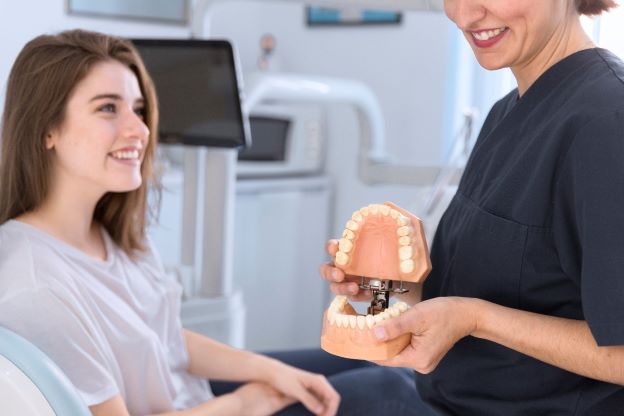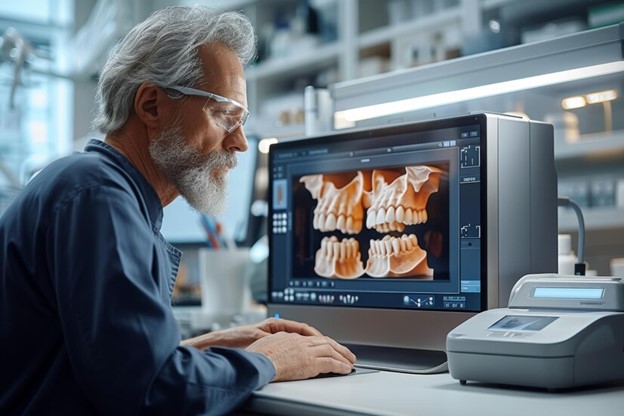
If you're considering advanced dental implants, you're making a wise choice to restore your smile and oral health. Missing teeth can significantly impact your self-esteem, and more importantly, your overall dental health. This comprehensive guide delves into everything you need to know about advanced dental implants, from cost to technology, and answers the key questions you might have.
How Dental Implants Can Restore Your Smile
Dental implants offer a permanent tooth replacement solution that functions and looks like natural teeth. Unlike dentures, which can slip and be uncomfortable, advanced dental implants securely anchor into the jawbone. This helps prevent bone loss and maintain your facial structure.
By opting for advanced dental implants, you’re investing in a solution that not only improves your appearance but also enhances your oral functionality. You can chew, speak, and smile with confidence, knowing your implants won’t shift or fall out. Learn more about the benefits and procedures involved in dental implants here.
Full Mouth Dental Implants: Restoring Comprehensive Oral Health
What are Full Mouth Dental Implants?

Full mouth dental implants are an advanced form of dental implants designed to replace an entire arch of teeth. Whether it's the upper or lower jaw, full mouth dental implants use multiple implants to secure a fixed bridge or denture.
Benefits of Full Mouth Dental Implants
Stability: Unlike traditional dentures, implant-supported dentures don’t move or slip.
Durability: Implants are a long-term solution, often lasting a lifetime with proper care.
Improved Oral Health: By preventing bone loss, implants maintain the structure of your jawbone.
Who Needs Full Mouth Dental Implants?
Full-mouth dental implants are ideal for those who have lost several or all of their teeth. They're especially beneficial if you're tired of the inconvenience of removable dentures.
Advanced Implant Technology: Leading the Way
Cutting-Edge Materials
Advanced implant technology uses biocompatible materials like titanium. These integrate seamlessly with your natural bone, ensuring long-lasting stability and durability.
3D Imaging and Planning

Advanced technology like 3D imaging and computer-aided design (CAD) is used for precise implant placement. This minimizes errors and increases the success rate of implantation.
Immediate Load Implants
One of the most exciting advancements is immediate load implants. This technology allows the placement of both the implant and the prosthetic tooth during the same visit. Immediate load implants drastically reduce the waiting period for tooth replacement.
How to Cover Missing Teeth While Waiting for the Implant?
Temporary Solutions
While waiting for your permanent dental implants, you have several options:
Temporary Partial Dentures: Also known as flippers, these are removable and can be used to fill the gap.
Essix Retainers: Clear retainers with false teeth to cover the missing area.
Temporary Bridges: A bridge using adjacent teeth to hold a false tooth in place.
These temporary solutions help maintain your appearance and function until your permanent tooth replacement is ready.
Exploring the Best Dental Implants Options
Assessing Quality and Performance
The best dental implants combine high-quality materials and advanced technology. These implants are designed for optimum osseointegration, where the implant integrates with your bone.
Choosing the Right Implant Specialist
Selecting a qualified and experienced implant specialist is crucial. Their expertise will significantly impact the success of your implant procedure.
Comparing Dental Implants vs. Dentures
Though dentures are less expensive, implants offer superior stability and longevity. The initial investment in implants often pays off in the long run, both in terms of performance and comfort.
Dental Implant Cost: Breaking Down the Expenses
Factors Influencing Cost
Several factors affect the dental implant cost, including:
Location: Costs can vary significantly depending on your geographic location.
Materials: Higher-quality materials can increase the overall cost.
Number of Implants Needed: Full mouth dental implants will cost more than single implants.
Insurance and Financing
Many insurance plans now offer some coverage for dental implants. Additionally, many dental practices provide financing options to make the cost more manageable.
Bone Grafting for Implants: Preparing for Success

When is Bone Grafting Necessary?
Bone grafting is often needed if you don't have sufficient natural bone to support the implant. This procedure ensures a stable foundation for dental implants.
Types of Bone Grafts
Autografts: Bone taken from another part of your body.
Allografts: Bone from a donor.
Xenografts: Bone from animals, usually cows.
Bone grafting for implants is essential for patients with severe bone loss or thinning.
How Painful is Getting a Dental Implant?
Pain Management During the Procedure
Local anesthesia is used to numb the area, so you shouldn’t feel pain during the implant procedure. Some patients may experience discomfort or pressure, but it’s generally manageable.
Post-Procedure Pain Relief
Post-surgery, it's common to experience some swelling and discomfort. Pain relievers can help alleviate this. Most patients report that any discomfort diminishes within a few days.
How Long Does a Dental Implant Take from Start to Finish?
Initial Consultation and Planning
The process begins with a thorough examination and planning. This stage usually includes X-rays and 3D imaging.
Surgical Placement
The next stage is the surgical placement of the implant into the jawbone. This procedure typically takes about 1-2 hours per implant.
Osseointegration Period
The implant must fuse with the bone, a process called osseointegration, which typically takes 3-6 months. During this period, a temporary tooth replacement may be provided.
Final Restoration
Once osseointegration is complete, the final crown or bridge is attached. In total, the entire process can take anywhere from 4-9 months.
Implant Restoration Options: Customizing Your Smile
Crowns and Bridges
Implant crowns and bridges are custom-made to match your natural teeth. These are excellent for single or multiple tooth replacements.
Implant-Supported Dentures
For those needing full arch replacements, implant-supported dentures offer increased stability and a natural look. They are securely held by multiple implants, preventing any movement.
Immediate Load Implants
With immediate load implants, you can walk out of your dentist’s office with a new smile right after surgery. This minimizes downtime and speeds up the healing process.
Final Thoughts and Next Steps
Choosing advanced dental implants is an excellent decision for restoring your smile and improving your oral health. From the latest in implant technology to the best dental implant options, this guide has covered all the essentials.
If you're considering this path, contact a trusted dental professional to discuss the specifics of your treatment plan. For more personalized information, reach out to us here.
Investing in advanced dental implants is more than just an investment in your appearance; it's an investment in your overall quality of life. So, take the next step confidently and restore your smile with advanced dental implants.